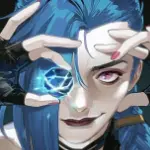Look, I’m not going to lie to you. I don’t think my children will think anything of The Legend of Ochi. I’m not saying it was a bad movie - it was definitely a nice break from mainstream sludge. It just doesn’t feel like a classic for the ages. And that’s fair enough. Not everything has to be eternal… Or does it?
I’m only asking because I’m having an existential crisis. As much as I enjoyed the film, what I took away from it was a sense that we’re losing something in the sands of time so slowly that we aren’t even aware of it, something small and simple and oh so important…
But I’m getting ahead of myself.
To understand my existential crisis, you first need to know a bit more about The Legend of Ochi itself. The film tells the story of Yuri, a young girl from an ambiguous eastern European village that has a mysterious forest full of terrible creatures known as the ochi. Yuri lives with her father (played by Willem Dafoe), a man who obsessively hunts the ochi with a mini militia of local boys to avenge his wife who was “taken” by them before she could give him a son.
As you can imagine, Yuri’s not exactly having a great time with a dad like that. Perhaps that’s part of why she betrays everything he stands for when she discovers a young ochi separated from its mother. Instead of killing it as her father would wish, she decides to go on a quest to reunite the small creature with its family. Shenanigans ensue, of course, but I don’t want to spoil everything. Let’s just say that the best description I’ve seen of the film was “imagine Wes Anderson’s How to Train Your Dragon and you’re halfway there” - and I promise they meant that in the best way possible.

It’s a cute if somewhat cliché premise that manages to feel just fresh enough thanks to its worldbuilding and aesthetics - but that’s not what made me watch the film. No, what really got me interested was the fact that the ochi were, at least in all close and medium shots, puppets. It matched the visual tone of the film perfectly, not blending in but at least fitting comfortably with all the other signs of nostalgia scattered throughout the film…
And that’s when the dread started seeping in. Because yes, it feels nostalgic to me, but why? I’m young enough that I only really remember the rise of CGI. Maybe there’s something about practical effects that reminds me of the silly yet charming imperfection of early visual effects? There’s something so beautiful about how simple and messy it was, a beauty that I can’t help but feel is born from the inherent sense of human passion, skill, and effort that the lack of realism contains.
But my kids, should I be so lucky to have them… Will they know that feeling, growing up in a post-AI world? Or will they stare blankly at practical effects and wonder why the CGI is so bad? Will they care at all?

It’s the kind of question that terrifies you… And then leads you to look at yourself from your own parents’ perspective. Or in my case, from a more temporally distant perspective. Because while I was mourning the idea that my children might lose their appreciation for human creation, I realised that I had already lost something else. Yuri knows a world of wild forests full of unknowable mysteries. She understands a fear and wonder that cuts deep into your chest to grip your heart -
Or so I imagine, because it’s a fear and wonder I’ll never know.
We’ve already destroyed many old-growth forests, and global warming certainly isn’t going to help those that are remaining. Even if I went to one that still exists, how would I experience it? No doubt through man-made paths and a cellphone camera, capturing and cataloguing, subconsciously distancing myself from the awe I so desperately crave. To think that “awesome” just means “cool” these days… For how many generations have we lost that feeling, and how can we get it back?
Is it already too late?

There are things I hope my children do forget, nostalgias that aren’t worth having. I can only dream that they find Yuri’s father’s desire for a son confusing, that they don’t understand why men were expected to be violent fighters and women caring nurturers. If they romanticise anything about the 1950s but its fashion, I’ll end up in an asylum for sure. But I do want them to feel nostalgia for the beauty of humanity, of nature, of being alive. Better yet, I want them to know it for themselves.
I just don’t know how I can make that happen.
There’s something hidden in Yuri’s quest to reunite the baby ochi with its people, in the way she bonds with it and learns to speak its language (okay, I couldn’t avoid all spoilers). There’s a sense of returning not just to a mother but to mother nature, to a connection with the universe at large… And of course I’m writing this alone, in a sterile room, on a computer, for people I’ll never know.
I need to find my way back.








Share your thoughts!
Be the first to start the conversation.